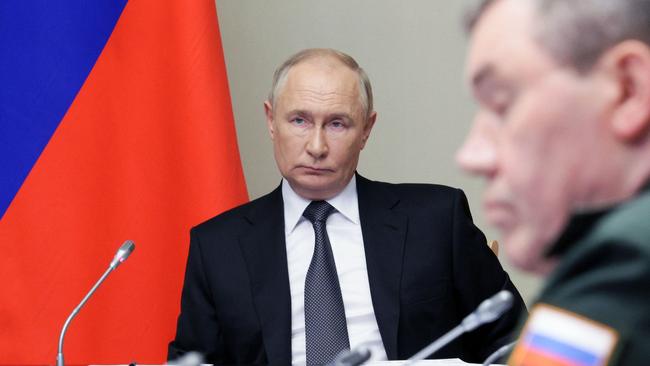Why Volodymyr Zelensky is gambling it all on Kursk
The Ukrainian leader drew the appropriate conclusions. His country had to fight the Russians in a different way. It was no good allowing Ukraine to remain in thrall to western conditions for the use of donated kit: no escalation, no firing inside Russian terrain. These increasingly absurd limitations were supposed to prevent a situation in which the Kremlin could declare it was under direct threat from NATO and stumble into the Third World War.
The compact has been sapping Ukraine, turning it into a permanent victim, a punch ball for the Russians. NATO had, in effect, become a self-deterring alliance. Once western arms are delivered, they should be used both to defend Ukrainians and take the fight to the Russians. What was the point of sending Ukrainians to Britain and Poland for sophisticated combined arms training if the war for Zelensky’s country was going to be fought in the trenches? The finger-wagging from the Biden White House or Olaf Scholz’s Berlin chancellery no longer made sense in Kyiv. Red lines need to be backed by political authority. Biden’s apparent infirmity has emboldened Zelensky.

And so, for a week, six of the best Ukrainian brigades, including the crack 82nd Airborne Assault, have been quickly spreading across Kursk, a strategically vital part of Russia. The light infantry carried in armoured support vehicles supplied by the West: the Strykers and Humvees from the US, the Marders from Germany. As the incursion continues Ukraine will want to use more western kit – US-made ATACMS missiles, for example, to hit airfields deeper in Russia. If asked, Washington may signal approval without giving an explicit yes. This would give them some leverage in future peace talks. Or Zelensky might just go ahead anyway.
Soon enough the British government will be asked to lift restrictions on Storm Shadow missiles so they can be used to hit approach roads and rail links bringing in Russian reinforcements. Keir Starmer should let it happen; the whole point of our military aid is to boost Ukrainian self-defence. As long as the Russians attack Ukraine from Russian soil, they are fair game.

The information blackout surrounding the incursion has been remarkable, guided by the need to fend off any western meddling, dodge the difficult questions about how Zelensky plans to end the job, and wrong-foot Putin. The message to the West: thanks for the guns and bucket-loads of advice but we set the pace of our own war. And let’s work on that basis in the post-Biden era. The message to Putin: this war is not a done deal. If you think we will walk into a supposed Trump-supported peace deal that partitions Ukraine, think again.
The Kursk adventure is constructed to play to the Ukraine army’s strengths – mobility, improvisation, speed of decision-making – and underline Putin’s insecurities. His first move was to try to sort out the institutional struggles between the army and the FSB, which in peacetime has responsibility for controlling thousands of miles of border. The head of the Russian army, General Valery Gerasimov, looks weak (as he did last summer when the Wagner boss, Yevgeny Prigozhin, launched a mutiny). So does the FSB leadership. Ergo, so does Putin.

Zelensky’s ambition is to force Putin to shift troops from eastern Ukraine to guard Kursk – and thus confront the Russian leader with the politically uncomfortable choice of raising troop numbers with a general mobilisation. That unpopular measure could revive an anti-war movement among the young, pop their complacency bubble. More threatening for Putin, it could cause splits in the army. Zelensky’s gamble: the cross-border invasion will reshuffle the cards in Ukraine’s favour. To head that off, Putin is getting ready to flatten the 1,000 square kilometres of the currently occupied section of Kursk province. Just as he let the distressed Kursk submarine sink to the bottom of the Barents Sea 24 years ago.
The fact is the West has helped to structure the Ukrainian way of battle so it can’t just shrug off the incursion as a daring but ultimately foolhardy stunt. Zelensky is trading the years of Donbas trench warfare that dispirited his nation and its donors and supporters in the West, for a form of Blitzkrieg. The search for lines of least resistance, the use of engineers, fast armour across countryside with enough roads for attackers to converge on objectives and diverge on the far side of them. Encirclement, breakthrough, deep penetration: this is how the German General Heinz Guderian pushed his way through France in 1940 and military academies have admired it ever since. The version in Kursk involved the blinding of Russian reconnaissance drones and clearing a path for tanks to pass through what is being described as an electromagnetic black hole.
Speed dazzles in war but it won’t be enough against the vast strategic depth of Russia, nor its ruthless use of overwhelming force when under threat. The brute reality is Kursk cannot be held for long.
Zelensky may be able to repeat the exercise elsewhere along the poorly defended Russian border and perhaps, just perhaps, the Russians will openly express their dismay at the competence of their rulers. Putin’s system is built on popular cynicism (nothing matters) and apathy (nothing can change). The latest twist in this war could help to crack that system.
The Times





Reading the room, Volodymyr Zelensky understood two important things at the NATO summit in Washington this summer. First, Ukraine had no chance of joining NATO any time soon. And second, Joe Biden, who welcomed him as “Vladimir Putin”, was already a lame duck president.